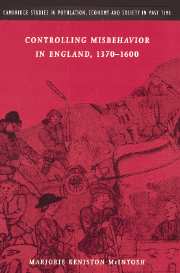Book contents
- Frontmatter
- Contents
- 1 List of illustrations
- 2 List of tables and lists
- Acknowledgements
- List of abbreviations
- Introduction
- Part I The history of social regulation
- Part II Factors that influenced social regulation
- 5 Some political considerations
- 6 Social ecology I: “broad response” and “no response” communities
- 7 Social ecology II: analysis by type of offences reported
- 8 Ideological/religious influences
- Conclusion: social regulation and the transition from medieval to early modern England
- Appendices
- Bibliography
- Index
- Cambridge Studies in Population, Economy and Society in Past Time
8 - Ideological/religious influences
Published online by Cambridge University Press: 23 November 2009
- Frontmatter
- Contents
- 1 List of illustrations
- 2 List of tables and lists
- Acknowledgements
- List of abbreviations
- Introduction
- Part I The history of social regulation
- Part II Factors that influenced social regulation
- 5 Some political considerations
- 6 Social ecology I: “broad response” and “no response” communities
- 7 Social ecology II: analysis by type of offences reported
- 8 Ideological/religious influences
- Conclusion: social regulation and the transition from medieval to early modern England
- Appendices
- Bibliography
- Index
- Cambridge Studies in Population, Economy and Society in Past Time
Summary
Though it has been convenient to separate our discussion of influences upon social regulation into thematic units, beliefs about the nature of society and what promoted its well-being and about moral behavior obviously provided the foundation for many of the patterns described in the first half of this study and interacted with many of the factors described in Chapters 5 through 7. In considering the ideological/religious context of control over misbehavior, this chapter provides only a brief discussion of a few selected topics: detailed analysis would require a book in its own right. Each section explores some aspect of the central question of how social and religious attitudes may have affected the course of local regulation between 1370 and 1600. It is of course impossible to identify ideological or religious factors with any assurance in the absence of personal documents that indicate how individual people's responses to wrongdoing were influenced by their ethical beliefs and by new approaches they encountered through sermons or lectures, plays, conversation, or reading. Instead we will note parallels between educated thought and local responses as a sign that local jurors were acting in accordance with the wider climate of values; we will look also for evidence that new ideas about society or the particular forms of misbehavior were introduced shortly before similar changes are observed in the lesser courts' responses, opening up the possibility of a more direct and immediate impact.
The chapter begins at a general level, tracing ideas about harmony, order, and poverty, the fundamental social concerns that lay at the root of local attention to wrongdoing.
- Type
- Chapter
- Information
- Controlling Misbehavior in England, 1370–1600 , pp. 186 - 208Publisher: Cambridge University PressPrint publication year: 1998

